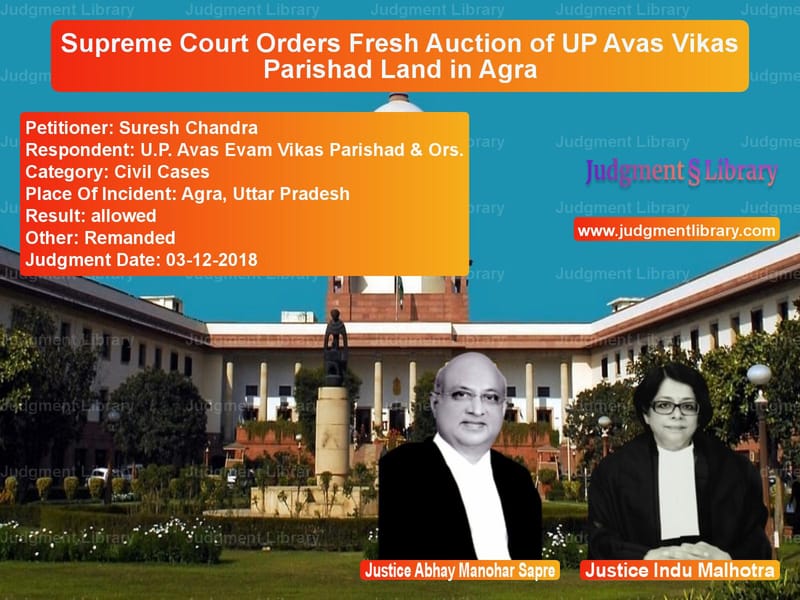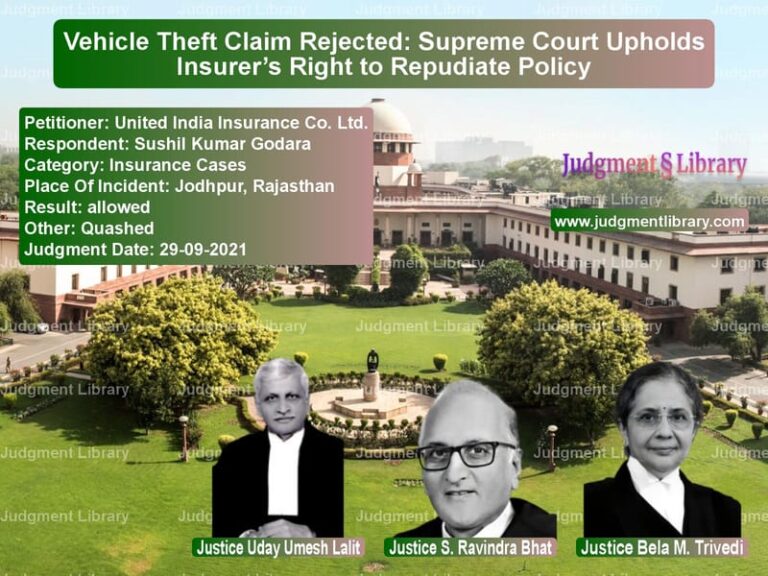Supreme Court Orders Fresh Auction of UP Avas Vikas Parishad Land in Agra
The Supreme Court of India, in the case of Suresh Chandra vs. U.P. Avas Evam Vikas Parishad & Ors., ruled that a disputed plot of land in Agra should be re-auctioned due to procedural lapses and a lack of transparency in prior auctions. The judgment emphasized the need for fair, well-publicized auctions to secure the best price for public assets. The Court also provided relief to the appellant and another bidder by ordering a refund of their deposited amounts with interest.
Background of the Case
The case involved a prime plot of land located at Sector 4B, Sikandara Yojna, Agra, owned by the U.P. Avas Vikas Parishad (hereinafter referred to as “the Parishad”). The Parishad initially invited applications for the auction of this land through advertisements in Hindi newspapers in August 2010. The reserve price was fixed at Rs.17,248 per square meter.
The appellant, Suresh Chandra, was among the bidders and offered a price of Rs.18,050 per square meter, the highest bid at the time. However, the Parishad rejected all bids, citing that they did not reflect the real market value of the land, and decided to conduct a re-auction.
In the subsequent re-auction, respondent no.5 emerged as the highest bidder with a price of Rs.28,000 per square meter. The appellant, in response, offered to buy the land at Rs.40,000 per square meter, later increasing his offer to Rs.45,000 per square meter. He also deposited Rs.1.15 crore towards the total purchase price of Rs.2.87 crore.
Despite the appellant’s willingness to pay a higher amount, the Parishad proceeded with the sale to respondent no.5, executing a sale deed in his favor. The appellant challenged this action by filing a writ petition before the High Court of Allahabad, which dismissed his plea, leading to the present appeal before the Supreme Court.
Petitioner’s Arguments
The appellant, Suresh Chandra, argued:
- The auction process lacked transparency and failed to attract adequate participation.
- The Parishad did not give proper publicity for the auction, limiting competition.
- The reserve price was set too low, leading to an undervaluation of the land.
- The Parishad unfairly rejected his offer of Rs.45,000 per square meter, which was significantly higher than respondent no.5’s bid.
- Since the second auction had been conducted under a High Court order making it subject to final judgment, the sale deed executed in favor of respondent no.5 should be void.
Respondents’ Arguments
The Parishad and respondent no.5 countered:
- Since the sale deed had already been executed, the transaction was final and could not be challenged.
- The Parishad had followed due process in conducting the auction and had fixed the reserve price appropriately.
- The appellant had not participated in the re-auction and could not challenge its outcome.
- Allowing a fresh auction would cause unnecessary delays and create uncertainty in property transactions.
Supreme Court’s Analysis and Ruling
The Supreme Court examined the entire auction process and found several deficiencies:
“The Parishad did not give adequate publicity for the sale of the land in question while conducting two auctions because we find that only two bidders could participate in the auctions.”
“The Parishad, keeping in view the value and the potential of the land, should have given adequate publicity in leading national newspapers to attract participation from a larger pool of bidders.”
The Court further noted that the Parishad had erred in fixing the reserve price too low, leading to an undervaluation of public assets:
“The Parishad committed an error in fixing the reserve price of the land at a very low amount. The land has a tremendous potential in the commercial market, as evidenced by the fact that both the bidders volunteered to pay much higher prices than their original bids.”
Given these findings, the Supreme Court directed that a fresh auction be conducted to ensure a fair and transparent process. The Court also mandated that the reserve price be revised after consulting experts to reflect the actual market value.
Final Judgment
The Supreme Court issued the following directives:
- The Parishad must conduct a fresh auction with wide publicity in national and regional newspapers.
- The reserve price must be fixed after consulting real estate valuation experts.
- The auction process must be transparent, allowing fair competition among bidders.
- Both the appellant and respondent no.5 are eligible to participate in the new auction but will not receive any preferential treatment based on previous bids.
- The Parishad must refund the deposited amounts of both the appellant and respondent no.5 with an interest rate of 6% per annum.
- The state government must issue a certificate to respondent no.5 allowing him to claim a refund of the stamp duty paid on the now-void sale deed.
- The entire re-auction process must be completed within six months.
Implications of the Judgment
The Supreme Court’s ruling has several important implications:
- Strengthening Auction Transparency: The judgment reinforces the need for government agencies to ensure fairness and transparency in auctioning public assets.
- Higher Revenue for the Government: By mandating a revised reserve price and fresh auction, the Court ensures that public land is not undervalued and sold below market rates.
- Legal Precedent for Future Auctions: The case sets a precedent that auctions must be conducted with adequate publicity to attract genuine and competitive bidding.
- Protection of Bidders’ Rights: The Court’s directive to refund unsuccessful bidders’ deposits with interest prevents financial loss due to procedural lapses.
Conclusion
The Supreme Court’s ruling in Suresh Chandra vs. U.P. Avas Evam Vikas Parishad & Ors. underscores the importance of fairness in government auctions. By ordering a re-auction and setting strict guidelines for publicity and reserve pricing, the Court ensures that public assets are sold at their true market value. This decision serves as a benchmark for transparency in public auctions and protects the interests of genuine bidders while maximizing government revenue.
Petitioner Name: Suresh Chandra.Respondent Name: U.P. Avas Evam Vikas Parishad & Ors..Judgment By: Justice Abhay Manohar Sapre, Justice Indu Malhotra.Place Of Incident: Agra, Uttar Pradesh.Judgment Date: 03-12-2018.
Don’t miss out on the full details! Download the complete judgment in PDF format below and gain valuable insights instantly!
Download Judgment: Suresh Chandra vs U.P. Avas Evam Vikas Supreme Court of India Judgment Dated 03-12-2018.pdf
Direct Downlaod Judgment: Direct downlaod this Judgment
See all petitions in Property Disputes
See all petitions in Landlord-Tenant Disputes
See all petitions in Damages and Compensation
See all petitions in Judgment by Abhay Manohar Sapre
See all petitions in Judgment by Indu Malhotra
See all petitions in allowed
See all petitions in Remanded
See all petitions in supreme court of India judgments December 2018
See all petitions in 2018 judgments
See all posts in Civil Cases Category
See all allowed petitions in Civil Cases Category
See all Dismissed petitions in Civil Cases Category
See all partially allowed petitions in Civil Cases Category







